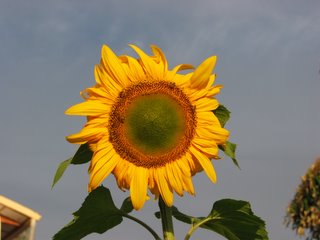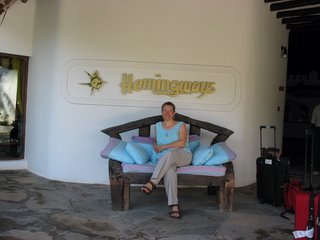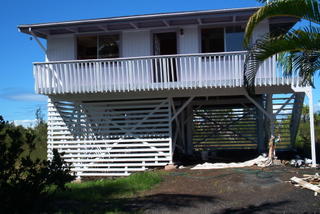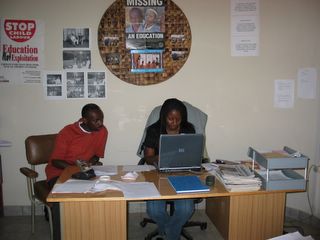 These are impala in Akagera Park, in the eastern side of Rwanda on the border with Tanzania. The burnt grass is due to a large fire that burned for a couple of days the weekend I was there together with a group of colleagues last July (more details below). It's worth clicking on all the photos to get a better view! In the park we saw a good variety of animals, including hippopotamus, african buffalo, baboons, vervet monkeys, zebra, topi (aka tsessebe), and eland. There are three national parks in Rwanda, the other two being Volcanoes National Park (known for the gorillas) and Nyungwe Forest (known for Colobus monkeys and many other animals and birds).
These are impala in Akagera Park, in the eastern side of Rwanda on the border with Tanzania. The burnt grass is due to a large fire that burned for a couple of days the weekend I was there together with a group of colleagues last July (more details below). It's worth clicking on all the photos to get a better view! In the park we saw a good variety of animals, including hippopotamus, african buffalo, baboons, vervet monkeys, zebra, topi (aka tsessebe), and eland. There are three national parks in Rwanda, the other two being Volcanoes National Park (known for the gorillas) and Nyungwe Forest (known for Colobus monkeys and many other animals and birds).
After four years in Rwanda and DR Congo I was diagnosed with myalgic encephalomyelitis in Oct ‘08. Following two years in Malta, I moved to Melbourne, Australia where I found a doctor who diagnosed fructose intolerance and - eventually - Lyme Disease. My health improved, I returned to work, and next week I'm going back to my former life on the Big Island of Hawaii. Take a look at older posts (2004-2008) for stories & photos from Africa.
Wednesday, December 14, 2005
 These are impala in Akagera Park, in the eastern side of Rwanda on the border with Tanzania. The burnt grass is due to a large fire that burned for a couple of days the weekend I was there together with a group of colleagues last July (more details below). It's worth clicking on all the photos to get a better view! In the park we saw a good variety of animals, including hippopotamus, african buffalo, baboons, vervet monkeys, zebra, topi (aka tsessebe), and eland. There are three national parks in Rwanda, the other two being Volcanoes National Park (known for the gorillas) and Nyungwe Forest (known for Colobus monkeys and many other animals and birds).
These are impala in Akagera Park, in the eastern side of Rwanda on the border with Tanzania. The burnt grass is due to a large fire that burned for a couple of days the weekend I was there together with a group of colleagues last July (more details below). It's worth clicking on all the photos to get a better view! In the park we saw a good variety of animals, including hippopotamus, african buffalo, baboons, vervet monkeys, zebra, topi (aka tsessebe), and eland. There are three national parks in Rwanda, the other two being Volcanoes National Park (known for the gorillas) and Nyungwe Forest (known for Colobus monkeys and many other animals and birds).
 Some zebra in Akagera Park. The blackened ground is from the fire that was raging the weekend we were there (back in July). It came fairly close to our tents during the night, but the park rangers stayed up and kept an eye on things in order to warn us if it got too close. The fire provided quite a spectacular back drop, and reminded me of watching the hillsides burning in East Timor.
Some zebra in Akagera Park. The blackened ground is from the fire that was raging the weekend we were there (back in July). It came fairly close to our tents during the night, but the park rangers stayed up and kept an eye on things in order to warn us if it got too close. The fire provided quite a spectacular back drop, and reminded me of watching the hillsides burning in East Timor.
Tuesday, December 13, 2005
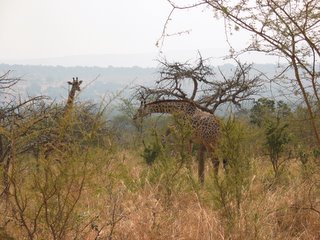 Some giraffe - taken in Akagera Park, one of Rwanda's three national parks, back in July this year (the dry season). A large group of us from work spent a weekend in the park, which was great fun. We camped on a hilltop with spectacular views of the lakes bordering Tanzania. The eastern side of Rwanda is more or less flat and dry, more similar to areas of Kenya and Tanzania than the rest of Rwanda with all its hills and mountains.
Some giraffe - taken in Akagera Park, one of Rwanda's three national parks, back in July this year (the dry season). A large group of us from work spent a weekend in the park, which was great fun. We camped on a hilltop with spectacular views of the lakes bordering Tanzania. The eastern side of Rwanda is more or less flat and dry, more similar to areas of Kenya and Tanzania than the rest of Rwanda with all its hills and mountains.
Sunday, December 11, 2005
 Butare province, Rwanda. Photo taken in early December. If you click on the photo to enlarge it, you'll get a better view of the typical pattern of housing in this area of Rwanda, i.e. individual houses on patches of land. In this hilly country, land is at a premium - this is the most densely populated country in Africa. Traditionally people feel most comfortable living on the patch of land that they farm. This is unlike many other countries where living in villages is more common. Noticable in this photograph is how dry it is, given that we are well into the rainy season. Rain has been sparse and sporadic since the season began in September, and in many places the beans (the staple food) are drying up and people expect to go hungry. Fortunately, the situation here is still far better than in other areas of southern Africa (notably Malawi and Zimbabwe) where there is now famine. For detailed information regarding the food situation in Africa, take a look at www.fews.net (famine early warning system), where there are details of rainfall and harvests. On the narrow valley floor in this photo are the rice fields. Valley floors are valuable land in the land of hills, and often stay wet and productive all year round (hence are known as 'marais' locally). Rice is not a traditional food here, but the government is encouraging production. The employment offered by the rice fields tempts some children to leave primary school.
Butare province, Rwanda. Photo taken in early December. If you click on the photo to enlarge it, you'll get a better view of the typical pattern of housing in this area of Rwanda, i.e. individual houses on patches of land. In this hilly country, land is at a premium - this is the most densely populated country in Africa. Traditionally people feel most comfortable living on the patch of land that they farm. This is unlike many other countries where living in villages is more common. Noticable in this photograph is how dry it is, given that we are well into the rainy season. Rain has been sparse and sporadic since the season began in September, and in many places the beans (the staple food) are drying up and people expect to go hungry. Fortunately, the situation here is still far better than in other areas of southern Africa (notably Malawi and Zimbabwe) where there is now famine. For detailed information regarding the food situation in Africa, take a look at www.fews.net (famine early warning system), where there are details of rainfall and harvests. On the narrow valley floor in this photo are the rice fields. Valley floors are valuable land in the land of hills, and often stay wet and productive all year round (hence are known as 'marais' locally). Rice is not a traditional food here, but the government is encouraging production. The employment offered by the rice fields tempts some children to leave primary school.
 This is a typical primary school in a rural area. At the far end you can see some new classrooms under construction. Population growth is high, so there are always more children to be accommodated in school; now that primary school fees have been abolished and the government is pushing to achieve the millenium development goal of getting all children into primary school, there are even more children to find places for. The teacher: pupil ratio is well over 50:1, which greatly impacts the quality of education. Noticable features of the school include the few windows - windows are on one side of the building only, with wooden shutters, no glass (far too expensive, and gets broken quickly), making the classrooms dark; and lack of water, either for drinking or for use in the toilets. There are no pictures on the walls, few books, no other teaching materials, no electricity. And it is up to the parents to build new classrooms, even though the majority have no income, surviving on subsistence farming.
This is a typical primary school in a rural area. At the far end you can see some new classrooms under construction. Population growth is high, so there are always more children to be accommodated in school; now that primary school fees have been abolished and the government is pushing to achieve the millenium development goal of getting all children into primary school, there are even more children to find places for. The teacher: pupil ratio is well over 50:1, which greatly impacts the quality of education. Noticable features of the school include the few windows - windows are on one side of the building only, with wooden shutters, no glass (far too expensive, and gets broken quickly), making the classrooms dark; and lack of water, either for drinking or for use in the toilets. There are no pictures on the walls, few books, no other teaching materials, no electricity. And it is up to the parents to build new classrooms, even though the majority have no income, surviving on subsistence farming.
 This young man was delighted to have his picture taken. I took several shots of him and the other boys with him, and then showed them the pictures on the small screen of my digital camera. That's one huge advantage of the digital - being able to show people the results immediately. Everyone gets a kick out of seeing their picture on that tiny screen, the children pointing, saying the names of their friends as they recognize their faces.
This young man was delighted to have his picture taken. I took several shots of him and the other boys with him, and then showed them the pictures on the small screen of my digital camera. That's one huge advantage of the digital - being able to show people the results immediately. Everyone gets a kick out of seeing their picture on that tiny screen, the children pointing, saying the names of their friends as they recognize their faces.
 Imps or angels? Click on the photo to get a better look at the faces of these young boys! Photo taken in the same rural area of Butare province as the one below.
Imps or angels? Click on the photo to get a better look at the faces of these young boys! Photo taken in the same rural area of Butare province as the one below.
Saturday, December 10, 2005
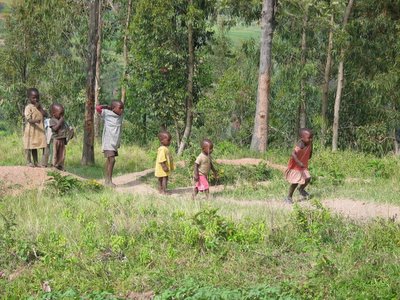 "Follow the leader!" Children in Africa, although often leading extremely harsh lives, also can have an enviable freedom in rural areas to play outside and roam at will. I've noticed here in rural areas that no matter how poor the children, there's strict gender division in clothing: girls wear dresses or skirts, boys wear shorts or trousers. Among better-off families in the towns the clothing divide is less strict.
"Follow the leader!" Children in Africa, although often leading extremely harsh lives, also can have an enviable freedom in rural areas to play outside and roam at will. I've noticed here in rural areas that no matter how poor the children, there's strict gender division in clothing: girls wear dresses or skirts, boys wear shorts or trousers. Among better-off families in the towns the clothing divide is less strict.
Tuesday, December 06, 2005
Another one!
Yes, for anyone asking, I felt the earthquake this afternoon. For those interested, there's more information on the BBC website: http://news.bbc.co.uk/2/hi/africa/4499938.stm
Apparently the epicentre was in DR Congo, some distance south of here, with a magnitude of 6.8. Here it was a fairly gentle shake that seemed to go on for an awfully long time - long enough to make me a bit nervous!
Yes, for anyone asking, I felt the earthquake this afternoon. For those interested, there's more information on the BBC website: http://news.bbc.co.uk/2/hi/africa/4499938.stm
Apparently the epicentre was in DR Congo, some distance south of here, with a magnitude of 6.8. Here it was a fairly gentle shake that seemed to go on for an awfully long time - long enough to make me a bit nervous!
Monday, December 05, 2005
Sunday, December 04, 2005
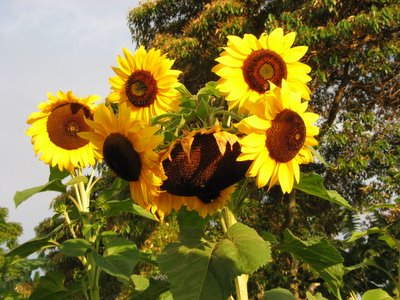 Sunflowers
SunflowersI’m growing sunflowers in the garden. Recently I realised how unique each one is. Some plants produce one single large flower, others may produce one large flower and several smaller ones, and some are a veritable bush with countless smaller buds. Some of the sunflowers grow only a couple of feet, yet others tower over me. I went out into the garden just after 6 am this morning and photographed some of them. I'd love to post a whole collage of sunflower photos, but unfortunately the speed of the connection doesn't allow that. Will have to limit myself!
Yesterday I was at a wedding, and a couple of weeks ago, a funeral. I’m writing these events up in my head (usually while doing my exercises or in the shower!) – getting them onto paper or electronic form takes a bit longer. In the meantime, life goes on. Our power supply is much improved since about two weeks ago, and we have power most days now. Nights are another matter, and most evenings we’re still in the dark. My generator broke down a week ago, so I’m cooking, reading, and eating by candlelight at the moment. It’s the rainy season, so my solar-powered lamp only gives a couple of hours light. In any case, all my exterior lights are not working, and the kitchen light has also gone (wiring problems, not bulbs). The fridge has also forgotten how to cool (though fortunately the small freezer section still functions), and my telephone can’t take incoming calls. At least there’s plenty of water, and thanks to all the day-time power I can take hot showers – always considered a luxury! A benefit of a dark night is the always amazing view of the stars. Orion lies on his side right outside my back door, and just over the front wall the new crescent moon shines, clearly framed in the shadow of the full moon.
Book of the day: I’m skimming through (it’s not heavy reading) “A Pirate Looks at Fifty” by Jimmy Buffett, left to me by an expat friend. Appropriate reading, with some light-hearted philosophy on getting through life this far. His goal in life is to have as much fun as possible, and he has some great quotes to back this up (“Only if we understand… can we conceive of the seemingly paradoxical phenomenon that people who are afraid of living are also especially frightened of death.”). For those of you who haven’t heard of him, Jimmy Buffett is mostly known in the States as a singer/songwriter. His most famous hit ‘Margaritaville’ was enormously popular in Aspen when I was there working the ’79-’80 ski season, and groups of us ‘locals’ used to down jugs of margaritas after work. ‘Rocky Mountain High’ was another favourite, and I remember seeing John Denver driving around town in his pick-up with a couple of Labrador retrievers in the back. Must be reading Buffett that takes me back!
If you haven’t looked at the blog for a while, the photographs below are from my recent one week holiday on the Kenyan coast.
Friday, December 02, 2005
 This is the reception area at Hemingways. On entry, this is one's first view of the hotel, and to the left of the reception desk the opening looks directly out across the terrace to the ocean - it's a delightful sight on arrival. The hotel staff are wonderfully friendly and relaxed, while maintaining high standards of service - a pleasant change from Rwanda, where staff training is still lacking. Note the Arabic influence in architectural style, and use of natural materials in the roof.
This is the reception area at Hemingways. On entry, this is one's first view of the hotel, and to the left of the reception desk the opening looks directly out across the terrace to the ocean - it's a delightful sight on arrival. The hotel staff are wonderfully friendly and relaxed, while maintaining high standards of service - a pleasant change from Rwanda, where staff training is still lacking. Note the Arabic influence in architectural style, and use of natural materials in the roof.
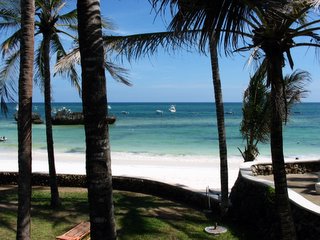 This was the view from my room at Hemingways. When the tide was high, it came right up to the hotel wall, and I could hear the waves at night. I spent not a few hours sitting on my balcony enjoying the view and allowing the ocean to provide a broader perspective to life.
This was the view from my room at Hemingways. When the tide was high, it came right up to the hotel wall, and I could hear the waves at night. I spent not a few hours sitting on my balcony enjoying the view and allowing the ocean to provide a broader perspective to life.
Thursday, December 01, 2005
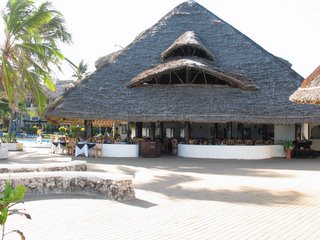 This is the hotel restaurant. During the winter months (May - October) there are walls (with windows) made from natural local materials, as the wind and high tides can bring water right up to this point. The walls were taken down the day after I arrived, marking the beginning of the high season. At night all the dining tables were set out on the terrace you see in front of the restaurant, and we dined by candle- and moon-light in the warm evening breeze. The food is excellent, with a speciality being the fresh ocean fish caught daily - I watched the boats coming in to shore and the fish being carried into the restaurant each afternoon.
This is the hotel restaurant. During the winter months (May - October) there are walls (with windows) made from natural local materials, as the wind and high tides can bring water right up to this point. The walls were taken down the day after I arrived, marking the beginning of the high season. At night all the dining tables were set out on the terrace you see in front of the restaurant, and we dined by candle- and moon-light in the warm evening breeze. The food is excellent, with a speciality being the fresh ocean fish caught daily - I watched the boats coming in to shore and the fish being carried into the restaurant each afternoon.
Wednesday, November 30, 2005
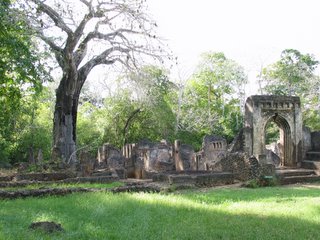 The town of Gede (aka Gedi), a few kilometres inland from Watamu, was inhabited from around the 12th or 13th century until approximately 600 years ago. The reason for abandonment is unknown, although speculation is either that the sea receded, or that a local river changed course, leaving the town (which has many deep wells) without water. Information on the 'net is hard to find, but the guidebooks to the area have more details. It's a beautiful site, and well worth visiting.
The town of Gede (aka Gedi), a few kilometres inland from Watamu, was inhabited from around the 12th or 13th century until approximately 600 years ago. The reason for abandonment is unknown, although speculation is either that the sea receded, or that a local river changed course, leaving the town (which has many deep wells) without water. Information on the 'net is hard to find, but the guidebooks to the area have more details. It's a beautiful site, and well worth visiting.
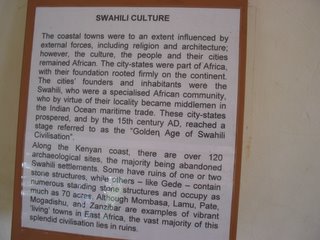
This sign is from the small one-room museum at the Gede ruins. If you click on it, the enlargement should be easy enough to read.
 This is Ashley, from South Africa, with the final catch of his fishing tournament. I enjoyed meeting the South Africans, who were all very positive about the future of their country.
This is Ashley, from South Africa, with the final catch of his fishing tournament. I enjoyed meeting the South Africans, who were all very positive about the future of their country.
Tuesday, November 29, 2005
 I enjoyed late afternoons doing laps in the hotel pool, seen here with the hotel bar, and Watamu Bay in the background.
I enjoyed late afternoons doing laps in the hotel pool, seen here with the hotel bar, and Watamu Bay in the background.
Monday, November 28, 2005
Sunday, November 27, 2005
November is almost gone…..
Are these blogs meant to be written daily?!! Before I forget everything that went on in November, here’s a quick update. The last week of October and first week of November were spent working intensively with an education specialist/consultant to the project. Every day was a workshop; our research data was pulled into focus, allowing us to work on future plans. It was intense and rewarding.
In mid-November I took a week off work to celebrate my birthday (one of those big round ones!) and went to the Kenya coast. On the flight from Nairobi to Mombasa I sat next to a woman travelling to celebrate her son’s birthday – the same day as mine! The first noticeable thing about Mombasa is that it’s an island. The second is how dirty the city is compared with Kigali. Rwanda is a veritable ‘Switzerland’ of cleanliness next to Kenya. Maybe the heat has something to do with it. Stepping off the plane, I felt the familiar breath of warm, moist, tropical air, and my eyes feasted on much-missed coconut palms. I stayed at the New Palm Tree hotel, not far from the old city. In the late afternoon, walking down to Fort Jesus, I was reminded of Malta with all its Arabic influence, old men sitting below the thick fort walls playing cards, young men playing a game of soccer in the warm shadows. The old town is a fascinating mixture of African, Arabic, and Indian cultures. Narrow streets become ever-narrower as one delves deeper, passing ornate wooden doors and balconies. I hope one day to also visit Zanzibar and Lamu, which have inherited similar cultures.
From Mombasa, a two-hour drive north by ‘matatu’ mini-bus (less frightening than I’d feared!), to Watamu, which is just south of Malindi, where I had booked a room at the wonderful Hemingways (www.hemingways.co.ke) as an extra special birthday treat. Apparently Bill Gates stayed here (I forgot to check the visitors book to confirm), and I know that Aidan Hartley stayed here, because the description in his book is unmistakable: “That night we propped up the bar under fibreglass black marlin trophies and old photos of Ernest Hemingway who had come here to go deep-sea fishing half a century before.” I enjoyed a drink in the bar on my last night with a group of new-found English friends, our only connection a week at Hemingways. Other guests included a large group of friendly South Africans here for a fishing tournament. The buzzing motors of the small boats taking them out to their flashy fishing fleet at six every morning roused me from sleep, and their return late afternoons marked time for tea (served by the pool, with delicate sandwiches and crêpes made on the spot).
Highlights from the week included a visit to near-by, fascinating, Gede, the ruins of an ancient Swahili town; and a morning out on a boat following pods of dolphins trying to get on with the task of feeding while we kept jumping into the deep water, masks, snorkels, and flippers securely on, trying to ‘swim with the dolphins’. They were too busy to have time for us, but it was a thrilling experience nevertheless! Hours gazing at the Indian Ocean watching the tide rise and fall, laps in the hotel pool, snorkelling on the reef, stretching in the gym, four-course gourmet dinners by candle-light on the terrace watched over by a full moon, and an inspiring book (The Kite Runner by Khaled Hosseini) from the hotel library…it all came to an end far too soon, and I would have happily stayed another week had work and budget allowed.
Back in Butare, my kitten, now named Jolie (because my driver kept saying ‘Elle est très jolie!), has grown and is softer and cuter than ever. Adrian Martin from UEA Norwich was in town and I enjoyed asking about all my UEA friends over dinner. My Indonesian friend, Rini, celebrated her 37th birthday last night with what must be the biggest, liveliest, party Butare has seen in a long time – a marquee in the garden, vast quantities of delicious Indonesian food, and an exceptionally divers group of guests from Rwanda, Kenya, Netherlands, Belgium, France, Sweden, England, and the USA. After my week on the coast I’d forgotten how cold it gets here at night – a Shetland sweater would have been a good idea – and when we returned to the car the condensation had to be wiped from the windows. I half-expected to see ice on the road. My fleece pyjamas were much appreciated last night!
Are these blogs meant to be written daily?!! Before I forget everything that went on in November, here’s a quick update. The last week of October and first week of November were spent working intensively with an education specialist/consultant to the project. Every day was a workshop; our research data was pulled into focus, allowing us to work on future plans. It was intense and rewarding.
In mid-November I took a week off work to celebrate my birthday (one of those big round ones!) and went to the Kenya coast. On the flight from Nairobi to Mombasa I sat next to a woman travelling to celebrate her son’s birthday – the same day as mine! The first noticeable thing about Mombasa is that it’s an island. The second is how dirty the city is compared with Kigali. Rwanda is a veritable ‘Switzerland’ of cleanliness next to Kenya. Maybe the heat has something to do with it. Stepping off the plane, I felt the familiar breath of warm, moist, tropical air, and my eyes feasted on much-missed coconut palms. I stayed at the New Palm Tree hotel, not far from the old city. In the late afternoon, walking down to Fort Jesus, I was reminded of Malta with all its Arabic influence, old men sitting below the thick fort walls playing cards, young men playing a game of soccer in the warm shadows. The old town is a fascinating mixture of African, Arabic, and Indian cultures. Narrow streets become ever-narrower as one delves deeper, passing ornate wooden doors and balconies. I hope one day to also visit Zanzibar and Lamu, which have inherited similar cultures.
From Mombasa, a two-hour drive north by ‘matatu’ mini-bus (less frightening than I’d feared!), to Watamu, which is just south of Malindi, where I had booked a room at the wonderful Hemingways (www.hemingways.co.ke) as an extra special birthday treat. Apparently Bill Gates stayed here (I forgot to check the visitors book to confirm), and I know that Aidan Hartley stayed here, because the description in his book is unmistakable: “That night we propped up the bar under fibreglass black marlin trophies and old photos of Ernest Hemingway who had come here to go deep-sea fishing half a century before.” I enjoyed a drink in the bar on my last night with a group of new-found English friends, our only connection a week at Hemingways. Other guests included a large group of friendly South Africans here for a fishing tournament. The buzzing motors of the small boats taking them out to their flashy fishing fleet at six every morning roused me from sleep, and their return late afternoons marked time for tea (served by the pool, with delicate sandwiches and crêpes made on the spot).
Highlights from the week included a visit to near-by, fascinating, Gede, the ruins of an ancient Swahili town; and a morning out on a boat following pods of dolphins trying to get on with the task of feeding while we kept jumping into the deep water, masks, snorkels, and flippers securely on, trying to ‘swim with the dolphins’. They were too busy to have time for us, but it was a thrilling experience nevertheless! Hours gazing at the Indian Ocean watching the tide rise and fall, laps in the hotel pool, snorkelling on the reef, stretching in the gym, four-course gourmet dinners by candle-light on the terrace watched over by a full moon, and an inspiring book (The Kite Runner by Khaled Hosseini) from the hotel library…it all came to an end far too soon, and I would have happily stayed another week had work and budget allowed.
Back in Butare, my kitten, now named Jolie (because my driver kept saying ‘Elle est très jolie!), has grown and is softer and cuter than ever. Adrian Martin from UEA Norwich was in town and I enjoyed asking about all my UEA friends over dinner. My Indonesian friend, Rini, celebrated her 37th birthday last night with what must be the biggest, liveliest, party Butare has seen in a long time – a marquee in the garden, vast quantities of delicious Indonesian food, and an exceptionally divers group of guests from Rwanda, Kenya, Netherlands, Belgium, France, Sweden, England, and the USA. After my week on the coast I’d forgotten how cold it gets here at night – a Shetland sweater would have been a good idea – and when we returned to the car the condensation had to be wiped from the windows. I half-expected to see ice on the road. My fleece pyjamas were much appreciated last night!
Saturday, November 05, 2005
 Cat lovers only!
Cat lovers only!Everyone else, please ignore this post! There's a new addition to my family: 'baby' (the right name will turn up in due course!). She's a fiercely independent and determined ball of pale grey fluff, found near the university campus by a friend.
Safi wasn't too happy about the new arrival at first, but now they play together and chase each other around the garden. Funniest is watching baby chase Safi! She's so tiny, and he's a big black fella! Here's a photo of Safi (next to one of my solar lamps) looking rather anxiously at baby:

Thursday, October 27, 2005
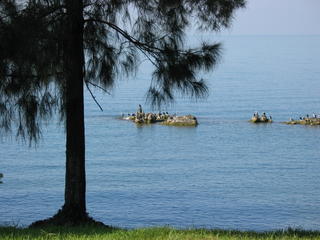
The Earth Moved!
We had a significant tremor just after midnight - it came with a strange rushing sound and the roof creaked and rattled. I lay awake, petrified, waiting for more, thinking of the people in Pakistan. But nothing fell or broke, the cats, dogs and chickens all slept on, so I dropped off to sleep again too. Rwanda is volcano country, and like the Big Island of Hawaii we get frequent tremors.
For today, I'm in the mood to post another peaceful shot of Lake Kivu. First prize to anyone who can identify the birds! (Click on the photo to enlarge it).
Tuesday, October 25, 2005

Could this pass for Hawaii?
Today's photo: the beach at Gisenyi. Seriously, the lakeside road in Gisenyi made me think of Kona village and what it probably looked like about 80 years ago. One day Gisenyi will be discovered by the rich and famous, and then it'll turn into another Kona. Come and visit before it's too late! (Don't forget to click on the photos and see them full-size!).
Monday, October 24, 2005

Another Monday!
Thanks to the fact that I don't have internet access from home at the moment (well, haven't had for some time now!!), and in any case, I was off enjoying myself in Kigali over the weekend, posting up all my Gisenyi photos could stretch to cover a few weeks at this rate! Today I'm posting another one from the civil marriage ceremonies - three older women, who are attired in a manner that is typical for ceremonies, with a piece of cloth (often white, but doesn't have to be) draped across the body and tied at one shoulder. They must have seen a great deal during their lives in this region of Africa....
Am happy to report that after eight days without power at the house (thanks to a power-greedy welding machine brought in to mend the gate that was about to drop off its hinges), the electricity was restored last Friday (eight days with no hot water, no fridge...). The fridge, however, isn't happy and isn't keeping anything very cold, so yet one more item to be repaired. The problem with power and fridges is probably a strong contributing factor in the many food poisoning cases here. I enjoyed two good meals out over the weekend - now I'm waiting to see if I ate more than I intended, like the last time I was in Kigali!
Thursday, October 20, 2005
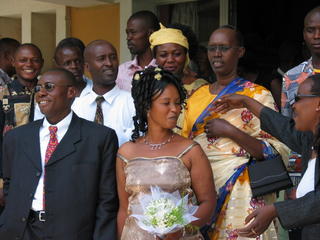
Gisenyi sits on the edge of Lake Kivu (the sixth largest lake in Africa), in the northeast of Rwanda, directly on the border with the Democratic Republic of Congo (DRC, formerly Zaire). I was there the weekend before last (8/9 October) to attend a colleague's wedding. The civil ceremony took place at the town hall, and two couples were getting married at the same time. The other couple were evidently Congolese - as they finished their vows, family and friends erupted with loud whoops and cheers: sounds of celebration that are quite foreign to the reserved Rwandans! I couldn't resist taking photos of the happy Congolese couple - here's my favourite:

Too much going on!
Well, I was going to write a long piece about my wonderful weekend in Gisenyi for a colleague's wedding, and then I was going to write about all the power and internet connection problems at the house, and there are loads of super photos I want to post....it's all going to take a bit of time, as it takes for ever to upload the photos. But I'll get them there eventually - be patient!
This photo is taken in Gisenyi on the shore of Lake Kivu. The buildings in the middle distance are in Goma - Democratic Republic of Congo. Note the mountains in the distance!
Monday, October 03, 2005
Visitors, books, and beautiful places
One of the pleasures of being here is getting to know interesting people. Not just some of the wonderful local staff I work with, but also fellow expatriates who have led fascinating lives elsewhere, and adventurous travellers passing through. This week a young couple from Ireland stopped by the office to learn more about our work, and after chatting for a few minutes I invited them to stay at the house – for the pleasure of having good company (I live alone). We enjoyed a couple of delightful evenings fixing dinner together, relishing the fresh carrots, beetroot, and green peppers from my garden, and talking about their travels, Ireland, and life in Rwanda. They are taking the same route (albeit decided on before reading the book) as Paul Theroux in his latest work Dark Star Safari, in which he travels from Cairo to Cape Town. I’ve met several people who’ve read the book, although I’ve yet to meet anyone who really likes it. Yes, he’s a pretty good writer, but can be mean spirited (a bit too honest?) And he has some extremely damning things to say about NGO workers! Maybe some of them are justified, but he makes me determined to “do different” as my diploma from the University of East Anglia says! Before I get side-tracked onto books, my visitors’ travels can be tracked via their website: www.allaboutafrica.net. I haven’t had a chance to see it yet, thanks to internet access problems at home (nothing new there!), but am looking forward to taking a look.
Another good book with a focus on east Africa is Aidan Hartley’s The Zanzibar Chest. Hartley is an astonishingly good writer, with among the most eloquent powers of description I’ve ever come across. He was born in Kenya and lives there now, and in the late 80’s and 90’s was a journalist covering wars in places like Ethiopia, Somalia, and Rwanda. His writing is so powerful that I have to taste it in small pieces, so I’m only half-way through the book. In addition to writing about his life as a correspondent, he also writes lovingly about his childhood in east Africa, his parents, and his father’s work in Yemen.
As an antidote to Hartley, I’m also reading (for the second time) Bird by Bird: Some Instructions on Writing and Life by Anne Lamott. Her frankness is hilarious, and along with some good advice on how to write, her stories about the agonising difficulties of getting words onto paper also turn into advice about taking a lighter view of life. I recommend it to everyone, aspiring writer or not!
I shall end this piece with photographs of a beautiful place where I spent a couple of days working last week. At the end of each month our various programmes gather for a day to present reports of our work during that month. At the end of each quarter we hold a one and a half or two day meeting to present more in-depth reports, learn about new policies, and discuss other issues. This quarter it was my team’s turn to make the meeting arrangements. A few miles outside of Butare there are, quite close to each other, a convent and a monastery, both offering meeting facilities. Both are set in beautiful grounds, wonderfully peaceful, filled with ancient trees, flowering bushes of bougainvillea, trim lawns, and colourful borders. We chose the monastery, whose gardens you can see in the photographs below. Imagine the peace and enjoy!
One of the pleasures of being here is getting to know interesting people. Not just some of the wonderful local staff I work with, but also fellow expatriates who have led fascinating lives elsewhere, and adventurous travellers passing through. This week a young couple from Ireland stopped by the office to learn more about our work, and after chatting for a few minutes I invited them to stay at the house – for the pleasure of having good company (I live alone). We enjoyed a couple of delightful evenings fixing dinner together, relishing the fresh carrots, beetroot, and green peppers from my garden, and talking about their travels, Ireland, and life in Rwanda. They are taking the same route (albeit decided on before reading the book) as Paul Theroux in his latest work Dark Star Safari, in which he travels from Cairo to Cape Town. I’ve met several people who’ve read the book, although I’ve yet to meet anyone who really likes it. Yes, he’s a pretty good writer, but can be mean spirited (a bit too honest?) And he has some extremely damning things to say about NGO workers! Maybe some of them are justified, but he makes me determined to “do different” as my diploma from the University of East Anglia says! Before I get side-tracked onto books, my visitors’ travels can be tracked via their website: www.allaboutafrica.net. I haven’t had a chance to see it yet, thanks to internet access problems at home (nothing new there!), but am looking forward to taking a look.
Another good book with a focus on east Africa is Aidan Hartley’s The Zanzibar Chest. Hartley is an astonishingly good writer, with among the most eloquent powers of description I’ve ever come across. He was born in Kenya and lives there now, and in the late 80’s and 90’s was a journalist covering wars in places like Ethiopia, Somalia, and Rwanda. His writing is so powerful that I have to taste it in small pieces, so I’m only half-way through the book. In addition to writing about his life as a correspondent, he also writes lovingly about his childhood in east Africa, his parents, and his father’s work in Yemen.
As an antidote to Hartley, I’m also reading (for the second time) Bird by Bird: Some Instructions on Writing and Life by Anne Lamott. Her frankness is hilarious, and along with some good advice on how to write, her stories about the agonising difficulties of getting words onto paper also turn into advice about taking a lighter view of life. I recommend it to everyone, aspiring writer or not!
I shall end this piece with photographs of a beautiful place where I spent a couple of days working last week. At the end of each month our various programmes gather for a day to present reports of our work during that month. At the end of each quarter we hold a one and a half or two day meeting to present more in-depth reports, learn about new policies, and discuss other issues. This quarter it was my team’s turn to make the meeting arrangements. A few miles outside of Butare there are, quite close to each other, a convent and a monastery, both offering meeting facilities. Both are set in beautiful grounds, wonderfully peaceful, filled with ancient trees, flowering bushes of bougainvillea, trim lawns, and colourful borders. We chose the monastery, whose gardens you can see in the photographs below. Imagine the peace and enjoy!

Gihindamuyaga monastery, Butare, Rwanda
The name means 'windy' - there are plenty of fresh breezes here! Mont Huye, a Butare landmark, can be seen in the background.
Daily routines
I sat down and wrote this piece early last week after a weekend without mains electricity or water. I’ve only just been able to post it, due to internet access problems. Our power problems at the office are now solved thanks to a fabulously impressive new generator with a reassuringly deep purr. I love it! At the house, water and power are in greater supply than this time last year. Work on the town’s water supply has continued all year, and the authorities are making efforts to improve the amount of electricity available. I am fortunate to have a generator at the house which I use in the evenings – it runs the fridge and lights, but not the hot water heater. However, only around 5% of homes in the country actually have access to electricity.
Some of my daily and weekend routines revolve around water and harnessing solar power. Drinking water is first boiled, and then filtered. This involves lots of filling up of large pots and then pouring the cooled water into the filter, and later filling up water bottles to carry upstairs. There’s running water in the house most of the time, although every so often it dries up. Sometimes it’s off for a few hours, sometimes for days. To deal with this there’s a large plastic tub of water in each bathroom, several yellow jerry cans of water kept filled just outside the kitchen door, and a large (2500 litre) “fast tank” or water bladder that sits on the back deck. So there’s always plenty of water, even though it might not be “running”.
This all involves plenty of lifting and carrying. For my bathroom upstairs, if I’ve heated water for washing – either due to lack of power or no running water – then I carry an extra large saucepan of water upstairs. The storage tub is usually filled by the housekeeper, although I’ll occasionally need to carry up a jerry can if the water runs low over the weekend. A jerry can full of water is terribly heavy!! I see both women and men carrying them on their heads and just can’t imagine how they do it.
The water filter is kept in the kitchen. It’s a wonderful stainless steel, two-piece tank, with ‘candle’ filters in the top half, and a tap on the lower half. I fill up water bottles from the filter which I then carry upstairs. I always keep a supply of several litres upstairs for drinking and brushing teeth. All that boiling of water, filling the filter, filling and carrying the bottles seems to take up quite a lot of time!
Another early morning task is setting my solar-powered lamp and solar-powered radio out in the sun. These are essential objects. Most nights we don’t have power, and even though I often run the generator in the evenings, I need the lamp for the 30 minutes between when I tell the guards to turn off the generator and while I read in bed before going to sleep. The radio is for listening to the BBC world service which puts me to sleep every night and keeps me feeling connected to the world when I wake up at 3 am and can’t get back to sleep. Every time I hear of budget cuts at the beeb I worry about the world service disappearing. It is very much superior to the Voice of America (VOA), whose presenters seem to think that their audience has the intellectual level of my cat. Actually, I think the cat prefers the BBC too. My solar powered radio is also a wind-up radio, and when there isn’t enough sun, and I’m too lazy to wind it up (it takes more energy than you might imagine), then I use my battery powered radio. Horrified at the amount of batteries I was using for everything, I quickly bought (over the internet, of course: www.sundancesolar.com) a battery charger attached to a solar panel. It only works when there’s a cloudless sky, and I have to keep a close eye on the batteries, as the first charger I tried soon melted when I wasn’t paying attention. So that’s a weekend task – putting the solar panel and battery charger out in the sun. At the weekends I also put out my duvet (down comforter to the Americans in the audience) and down pillows in the sun. They’re not solar powered, but the sun makes them fresh and fluffy again. And yes, it’s cool enough at night here that I need my duvet! It’s a lightweight one, and some nights it gets so cold that I have to put on my winter pyjamas and wriggle around a lot trying to keep warm! (Which is also why I find the water too cold for washing with in the mornings).
Whoops! I got so carried away with writing that I almost forgot to fix tea for the gardener; and I need to make lunch for a friend who’s arriving in an hour – bye!
I sat down and wrote this piece early last week after a weekend without mains electricity or water. I’ve only just been able to post it, due to internet access problems. Our power problems at the office are now solved thanks to a fabulously impressive new generator with a reassuringly deep purr. I love it! At the house, water and power are in greater supply than this time last year. Work on the town’s water supply has continued all year, and the authorities are making efforts to improve the amount of electricity available. I am fortunate to have a generator at the house which I use in the evenings – it runs the fridge and lights, but not the hot water heater. However, only around 5% of homes in the country actually have access to electricity.
Some of my daily and weekend routines revolve around water and harnessing solar power. Drinking water is first boiled, and then filtered. This involves lots of filling up of large pots and then pouring the cooled water into the filter, and later filling up water bottles to carry upstairs. There’s running water in the house most of the time, although every so often it dries up. Sometimes it’s off for a few hours, sometimes for days. To deal with this there’s a large plastic tub of water in each bathroom, several yellow jerry cans of water kept filled just outside the kitchen door, and a large (2500 litre) “fast tank” or water bladder that sits on the back deck. So there’s always plenty of water, even though it might not be “running”.
This all involves plenty of lifting and carrying. For my bathroom upstairs, if I’ve heated water for washing – either due to lack of power or no running water – then I carry an extra large saucepan of water upstairs. The storage tub is usually filled by the housekeeper, although I’ll occasionally need to carry up a jerry can if the water runs low over the weekend. A jerry can full of water is terribly heavy!! I see both women and men carrying them on their heads and just can’t imagine how they do it.
The water filter is kept in the kitchen. It’s a wonderful stainless steel, two-piece tank, with ‘candle’ filters in the top half, and a tap on the lower half. I fill up water bottles from the filter which I then carry upstairs. I always keep a supply of several litres upstairs for drinking and brushing teeth. All that boiling of water, filling the filter, filling and carrying the bottles seems to take up quite a lot of time!
Another early morning task is setting my solar-powered lamp and solar-powered radio out in the sun. These are essential objects. Most nights we don’t have power, and even though I often run the generator in the evenings, I need the lamp for the 30 minutes between when I tell the guards to turn off the generator and while I read in bed before going to sleep. The radio is for listening to the BBC world service which puts me to sleep every night and keeps me feeling connected to the world when I wake up at 3 am and can’t get back to sleep. Every time I hear of budget cuts at the beeb I worry about the world service disappearing. It is very much superior to the Voice of America (VOA), whose presenters seem to think that their audience has the intellectual level of my cat. Actually, I think the cat prefers the BBC too. My solar powered radio is also a wind-up radio, and when there isn’t enough sun, and I’m too lazy to wind it up (it takes more energy than you might imagine), then I use my battery powered radio. Horrified at the amount of batteries I was using for everything, I quickly bought (over the internet, of course: www.sundancesolar.com) a battery charger attached to a solar panel. It only works when there’s a cloudless sky, and I have to keep a close eye on the batteries, as the first charger I tried soon melted when I wasn’t paying attention. So that’s a weekend task – putting the solar panel and battery charger out in the sun. At the weekends I also put out my duvet (down comforter to the Americans in the audience) and down pillows in the sun. They’re not solar powered, but the sun makes them fresh and fluffy again. And yes, it’s cool enough at night here that I need my duvet! It’s a lightweight one, and some nights it gets so cold that I have to put on my winter pyjamas and wriggle around a lot trying to keep warm! (Which is also why I find the water too cold for washing with in the mornings).
Whoops! I got so carried away with writing that I almost forgot to fix tea for the gardener; and I need to make lunch for a friend who’s arriving in an hour – bye!
Tuesday, September 20, 2005
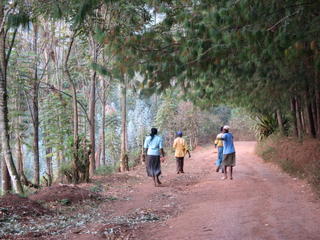
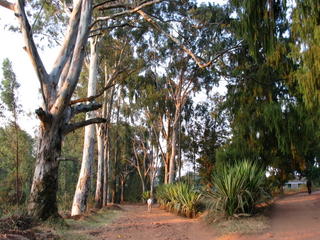
The path not taken...
We had a tremendous thunder storm last night and it rained for hours and hours until morning. The rainy season has really begun! The storms here bring violent winds, brilliant flashes of lightning that go on and on, and the loudest, heaviest drum rolls of thunder I've ever heard anywhere. When the storms come at night I can't sleep, so I turn on the BBC world service and turn up the volume to hear it above the pounding rain.
It rained again this afternoon, leaving the paths too muddy to walk home. There's a wonderful track that starts just outside our office with enormous old eucalyptus trees, and as I walk down I breathe deeply enjoying their wonderful scent. The path dips down into the valley and then quickly turns up towards the area of town where I live, called Taba. It's a pleasant residential suburb with wide, unpaved roads and houses varying from modest to outrageous, inhabited by university professors, international NGO staff, and wealthier business owners. The photos above show the path, the one with the figure in the distance is taken near the office, the other one further down the track. Occasionally there are vervet monkeys playing in the pine trees on the right.
Monday, September 19, 2005

My friends in Kigali, Jean Pierre and Beata.
I forgot to add previously, that if you click on any of the photos, you'll get a larger version of it.
Land of smiles!
A typical week: no internet access at the office, and sporadic access at home. I had a pleasant weekend in Kigali (10th & 11th September), staying with friends Jean Pierre and Beata (see photo!), enjoying the rare luxury of a massage and pedicure, a superb Sunday barbeque lunch with a Japanese friend, and a visit to Jean Pierre’s uncle Stany. Somewhere along the way I picked up some nasty microbes which woke me at 4 am on Tuesday, propelling me into the bathroom and leading to a couple of days off work. I’ve now lost count how many times I’ve come down with food poisoning! I do seem to be somewhat more susceptible than others, but lest you think this only happens to lily-livered foreigners, I assure you that both Rwandan and other African friends suffer their fair share of stomach problems. In a society where few homes have running water, washing ones hands is not an automatic practice. The power cuts add to the problem, with poor refrigeration in restaurants leading to contaminated food.
But let me tell you about some of the good things in Rwanda! Just for a start, we have the most perfect climate in the world! If you don’t believe me, then take a look at the www.bbcworldservice.com website world weather. You’ll see that the temperature here is generally a pleasant 24 degrees centigrade, occasionally a few degrees higher or lower, dropping to a comfortable 15 degrees at night. Most days are sunny, cool in the shade, warm in the sun. Kigali is hotter than Butare, although it’s still possible to walk around in the middle of the day without becoming totally exhausted. The country is blessed with a rainy season that extends more or less from September to late May, allowing for two growing seasons, and even a third one on the flat valley floors, or the ‘marais’. Although there is malnutrition due to poverty and lack of nutritional knowledge, the type of famine threatening other countries in Africa is rare here (check www.fews.net for further details). Green is the predominant colour across the country, with the intensively cultivated hillsides only turning brown in patches during the short dry season. Avocados, a luxury for many of you, drip off the trees and people even feed them to their cats!
Maybe it’s all the sunshine and greenery that helps many keep a smile on their face. As I gaze out the car window on my way to work or during the drive from Butare up to Kigali, I often notice the smiles and laughter of people chatting together as they walk along the side of the road. Young children can often be seen dancing to some tune inside their heads, or running and shouting at each other while chasing a home-made football on their way home from school in the late afternoons. Other children, too many of them, are tending the family cow, fetching water, carrying firewood…
The rainy season is getting off to a late start, and we’ve had only three good rain showers since late August. But that’s been enough to jolt my garden into action and it’s now springing back to life. During the dry season the flowers disappear and the grass stops growing, but now flowers are appearing again, and I’ve planted the vegetable beds with tomatoes, spinach, aubergine, beetroot, green peppers, leeks, spring onions, and much more!
A delightful story from last week: the local Gacaca court takes place in Butare every Wednesday afternoon, but last week it began in the morning and lasted all day. When a Dutch friend called his usual taxi driver to get a ride to work (his wife had gone off to Kigali in the family car), the driver told him he couldn’t drive because of Gacaca (all business closes down during the time when the court is in session), however my friend could take the taxi for the day and drive himself!! So he did! And when I visited in the evening, the taxi was sitting in the driveway, waiting for the taxi driver to come and reclaim it.
And now I’d better get back to answering a few e-mails. It’s been wonderful hearing from you, and I always enjoy news from afar!
House for rent!
My house on the Big Island is finally ready for occupation again. If you know of anyone interested, please ask them to contact Debbie Laga at Day-Lum in Hilo. Mahalo!
(The photo below is my Hawaii house – as I said, I’m still learning how to post things properly on the blog!!)
A typical week: no internet access at the office, and sporadic access at home. I had a pleasant weekend in Kigali (10th & 11th September), staying with friends Jean Pierre and Beata (see photo!), enjoying the rare luxury of a massage and pedicure, a superb Sunday barbeque lunch with a Japanese friend, and a visit to Jean Pierre’s uncle Stany. Somewhere along the way I picked up some nasty microbes which woke me at 4 am on Tuesday, propelling me into the bathroom and leading to a couple of days off work. I’ve now lost count how many times I’ve come down with food poisoning! I do seem to be somewhat more susceptible than others, but lest you think this only happens to lily-livered foreigners, I assure you that both Rwandan and other African friends suffer their fair share of stomach problems. In a society where few homes have running water, washing ones hands is not an automatic practice. The power cuts add to the problem, with poor refrigeration in restaurants leading to contaminated food.
But let me tell you about some of the good things in Rwanda! Just for a start, we have the most perfect climate in the world! If you don’t believe me, then take a look at the www.bbcworldservice.com website world weather. You’ll see that the temperature here is generally a pleasant 24 degrees centigrade, occasionally a few degrees higher or lower, dropping to a comfortable 15 degrees at night. Most days are sunny, cool in the shade, warm in the sun. Kigali is hotter than Butare, although it’s still possible to walk around in the middle of the day without becoming totally exhausted. The country is blessed with a rainy season that extends more or less from September to late May, allowing for two growing seasons, and even a third one on the flat valley floors, or the ‘marais’. Although there is malnutrition due to poverty and lack of nutritional knowledge, the type of famine threatening other countries in Africa is rare here (check www.fews.net for further details). Green is the predominant colour across the country, with the intensively cultivated hillsides only turning brown in patches during the short dry season. Avocados, a luxury for many of you, drip off the trees and people even feed them to their cats!
Maybe it’s all the sunshine and greenery that helps many keep a smile on their face. As I gaze out the car window on my way to work or during the drive from Butare up to Kigali, I often notice the smiles and laughter of people chatting together as they walk along the side of the road. Young children can often be seen dancing to some tune inside their heads, or running and shouting at each other while chasing a home-made football on their way home from school in the late afternoons. Other children, too many of them, are tending the family cow, fetching water, carrying firewood…
The rainy season is getting off to a late start, and we’ve had only three good rain showers since late August. But that’s been enough to jolt my garden into action and it’s now springing back to life. During the dry season the flowers disappear and the grass stops growing, but now flowers are appearing again, and I’ve planted the vegetable beds with tomatoes, spinach, aubergine, beetroot, green peppers, leeks, spring onions, and much more!
A delightful story from last week: the local Gacaca court takes place in Butare every Wednesday afternoon, but last week it began in the morning and lasted all day. When a Dutch friend called his usual taxi driver to get a ride to work (his wife had gone off to Kigali in the family car), the driver told him he couldn’t drive because of Gacaca (all business closes down during the time when the court is in session), however my friend could take the taxi for the day and drive himself!! So he did! And when I visited in the evening, the taxi was sitting in the driveway, waiting for the taxi driver to come and reclaim it.
And now I’d better get back to answering a few e-mails. It’s been wonderful hearing from you, and I always enjoy news from afar!
House for rent!
My house on the Big Island is finally ready for occupation again. If you know of anyone interested, please ask them to contact Debbie Laga at Day-Lum in Hilo. Mahalo!
(The photo below is my Hawaii house – as I said, I’m still learning how to post things properly on the blog!!)
Friday, September 09, 2005
What am I doing here?
I have enjoyed receiving all the messages and comments – thank you! I’m writing during what’s left of my lunch hour at the office, although the internet is down at the moment. With luck I’ll be able to post this tonight from home.
A few friends have asked about my work, so I’ll take a stab at describing what our project is all about. My title is ‘Education Adviser’ and I direct a small team (numbers vary from four to twelve, depending what stage of the project we’re on) working to provide support to primary schools. The purpose of the project is to increase primary school enrolment by encouraging collaboration between the schools, families, and communities. More specifically, we work with twelve primary schools in this province (right now we’re in Butare province, but the provinces are about to be reorganized, so that could change!) and we support government policy on Parent Teacher Associations to help the schools develop their PTAs.
Work progresses slowly. I arrived in May 2004 and my first four staff members (the researchers) were hired the following month. We then spent several months doing background training in education issues and writing our log frame (‘logical framework’ – a planning tool used by many development projects). This phase was rather like leading an exclusive seminar group at university and was highly enjoyable! Once we had a good idea of how we intended to run the project, or at least the first phase, we hired eight research assistants. We then spent several more months training: human rights, gender, HIV/AIDS, participatory rural appraisal (PRA), and research skills for social analysis. The research skills was a course I took at the University of East Anglia in 2003, which I adapted for my team. Interspersed with the training we carried out stakeholder analysis meetings with community members in the four districts where we work – we work with three schools in each of the four districts. The districts will also undergo re-organisation, so it’ll be interesting to see how that affects our work!
We finally began our first phase of research – collecting baseline data for the project in April this year. Apart from desk research, i.e. literature review and hunting for relevant materials on the internet, we carried out a survey using a questionnaire administered in person by members of the research team, individual interviews with a range of stakeholders (parents, teachers, local business owners, pupils, children who had dropped out of school or who had never attended school), and several focus group discussions. The research ended last month – August – and now team members are busy analysing a mountain of data.
Where does this lead us? We will soon have a very good idea about what is happening in practice in the schools, how well (or not) PTAs are functioning, why children are dropping out of school, parental attitudes towards education and towards involvement in their children’s education, and more! The information will then help us, together with community members, develop appropriate models for how PTAs should function in their communities. Then we get to work on assisting schools and communities to turn their PTAs into effective instruments to improve school management, increase enrolment, and increase retention rates (drop out rates are exceptionally high). This all sounds quite straightforward, but needs to be put in a context where the majority of parents are illiterate, schools do not have electricity or running water (let alone computers!), there are no telephones, and most head teachers don’t even have an office to themselves.
Time for me to get back to work. I’m posting a photograph of two of my research team – there are five of us sharing a small office. We have one laptop, mainly used by me, and then share three desktop computers in another room with the two other projects (community development and child survival).
A few friends have asked about my work, so I’ll take a stab at describing what our project is all about. My title is ‘Education Adviser’ and I direct a small team (numbers vary from four to twelve, depending what stage of the project we’re on) working to provide support to primary schools. The purpose of the project is to increase primary school enrolment by encouraging collaboration between the schools, families, and communities. More specifically, we work with twelve primary schools in this province (right now we’re in Butare province, but the provinces are about to be reorganized, so that could change!) and we support government policy on Parent Teacher Associations to help the schools develop their PTAs.
Work progresses slowly. I arrived in May 2004 and my first four staff members (the researchers) were hired the following month. We then spent several months doing background training in education issues and writing our log frame (‘logical framework’ – a planning tool used by many development projects). This phase was rather like leading an exclusive seminar group at university and was highly enjoyable! Once we had a good idea of how we intended to run the project, or at least the first phase, we hired eight research assistants. We then spent several more months training: human rights, gender, HIV/AIDS, participatory rural appraisal (PRA), and research skills for social analysis. The research skills was a course I took at the University of East Anglia in 2003, which I adapted for my team. Interspersed with the training we carried out stakeholder analysis meetings with community members in the four districts where we work – we work with three schools in each of the four districts. The districts will also undergo re-organisation, so it’ll be interesting to see how that affects our work!
We finally began our first phase of research – collecting baseline data for the project in April this year. Apart from desk research, i.e. literature review and hunting for relevant materials on the internet, we carried out a survey using a questionnaire administered in person by members of the research team, individual interviews with a range of stakeholders (parents, teachers, local business owners, pupils, children who had dropped out of school or who had never attended school), and several focus group discussions. The research ended last month – August – and now team members are busy analysing a mountain of data.
Where does this lead us? We will soon have a very good idea about what is happening in practice in the schools, how well (or not) PTAs are functioning, why children are dropping out of school, parental attitudes towards education and towards involvement in their children’s education, and more! The information will then help us, together with community members, develop appropriate models for how PTAs should function in their communities. Then we get to work on assisting schools and communities to turn their PTAs into effective instruments to improve school management, increase enrolment, and increase retention rates (drop out rates are exceptionally high). This all sounds quite straightforward, but needs to be put in a context where the majority of parents are illiterate, schools do not have electricity or running water (let alone computers!), there are no telephones, and most head teachers don’t even have an office to themselves.
Time for me to get back to work. I’m posting a photograph of two of my research team – there are five of us sharing a small office. We have one laptop, mainly used by me, and then share three desktop computers in another room with the two other projects (community development and child survival).
Monday, September 05, 2005
My first post, my first 'blog'. I've decided that this is the best way to keep in touch with friends and family. I've proved hopeless at keeping up with e-mail messages: my in-box contains a hundred or so unanswered letters. If you haven't heard from me for a while, you're not alone! The last letter I sent out to all my friends was well over a year ago. A few reasons for this: lack of time. Yes, like most people I know, I'm too busy having a life! Lack of electricity: Rwanda has been suffering severe power shortages for the past couple of years. We get lots of promises from Electrogaz but not much improvement. Actually, to be honest, the situation now is a lot better than it was at this time last year, when we might get one hour of power in 24 hours. We get more now, but it's totally unpredicatable, and often as not at night, i.e. from around 11 pm to 5 am. I'll write more about the power situation and how it affects lives in later posts. One more reason: the slow internet connection, and frequent disruptions to the phone connection. Back in March, for example, the laptop I'm using got zapped by a rogue bolt of lightning that fried the internal modem and speakers. No more internet. No more music! And yes, I was using one of those phone line surge protectors!
So I'm writing this to keep in touch with friends and family members, and for myself! I love writing, and have taken numerous writing workshops over the years. However I need more incentive to sit down and write, and I'm planning for this blog to give me that incentive. Your feedback is welcome and will encourage me (I hope!) to write more. I want to tell you something about everyday life in Rwanda (albeit, from my priviledged position as an expat worker), and will post as many photographs as I can.
That's it for the moment. Now I'm keen to see if I can get this posted and figure out how this blogging stuff actually works. Bear with me!!
So I'm writing this to keep in touch with friends and family members, and for myself! I love writing, and have taken numerous writing workshops over the years. However I need more incentive to sit down and write, and I'm planning for this blog to give me that incentive. Your feedback is welcome and will encourage me (I hope!) to write more. I want to tell you something about everyday life in Rwanda (albeit, from my priviledged position as an expat worker), and will post as many photographs as I can.
That's it for the moment. Now I'm keen to see if I can get this posted and figure out how this blogging stuff actually works. Bear with me!!
Subscribe to:
Posts (Atom)
